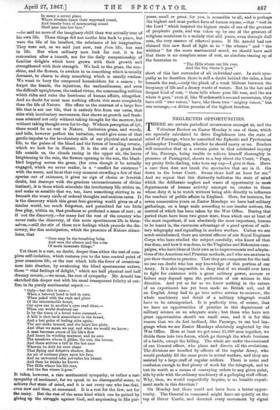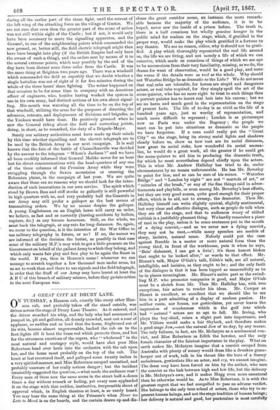NEGLECTED OPPORTUNITIES.
THERE are certain periodical occurrences amongst us, and the Volunteer Review on Easter Monday is one of these, which are specially calculated to drive Englishmen into the state of mind of Panurge, when he consulted the Ephestic and Pyrrhonian philosopher Trouillogan, whether he should marry or no. Readers will remember that at a certain point in that celebrated inquiry of his, Panurge, being unable to relieve himself thoroughly in presence of Pantagruel, shouts to a boy about the Court, "Page, my pretty little darling, take here my cap—I give it thee. Have a care thou dost not break the spectacles that are in it. Go down to the lower Court. Swear there half an hour for me." And we repeat that this distinctly indicates the state of mind which the deliberate neglect and waste of opportunity in most departments of human activity amongst us, creates in those whose duty it is to watch without being able directly to influence the conduct of public affairs in England. Here, for instance, for seven consecutive years on Easter Mondays we have had military gatherings, on a large scale according to our insular notions, the control of which has been taken by the War Office. During that period there have been two great wars, from which one at least of the most important, if not absolutely the most important, lessons to be learnt is, the enormous advantage of a good system of mili- tary telegraphy and signalling in modern warfare. Unless we are much misinformed, there are several officers of our Royal Engineer Corps who have studied the subject carefully, who know all that was done, and how it was done, in the Virginian and Bohemian cam- paigns, who have ideas of their own as to improvements and adapta- tions of the American and Prussian methods, and who are anxious to put their theories in practice. That they are competent for the task no one can doubt who has any knowledge of this portion of our Army. It is also impossible to deny that if we should ever have to fight for existence with a great military power, success or failure may depend upon the perfection of our science in this direction. And yet so far as we know nothing in the nature of an experiment has yet been made on British soil, and if an English Army had to go into active service to-morrow, the whole machinery and detail of a military telegraph would have to be extemporized. It is perfectly true, of course, that we have no opportunities of practice in this department of military science on an adequate scale ; but those who have not great opportunities should use small ones, and it is for this reason that we do feel inclined, like Panurge, to use bad lan- guage when we see Easter Mondays absolutely neglected by the War Office. Here at least we get some 25,000 men together, we divide them into two forces, which go through the whole business of a battle, except the killing. The whole are under the command of one General officer, who plans and directs all the evolutions. The divisions are handled by officers of the regular Army, who would probably fill the same posts in actual warfare, and they are assisted by a large staff of regular soldiers. There is noise and. confusion enough to find plenty of work for the telegraph, and to test its worth as a means of conveying orders to any given point, aide by side with the ordinary machinery of a galloping staff officer. Why, then, we would respectfully inquire, is no humble experi- ment made in this direction ?
On Monday last there could not have been a better oppor- tunity. The General in command might have sat quietly on the top of Dover Castle, and directed every movement by signal during all the earlier part of the sham fight, until the retreat of the left wing of the attacking force on the village of Guston. We are not sure that even then the greater part of the scene of action was not still within sight of the Castle ; but if not, it would only have been necessary to move the signalling apparatus, and the General, to one of the neighbouring points which commanded the new ground, or, better still, the field electric telegraph might then have been brought into play (if the British Empire had only been the owner of such a thing), and the orders sent by means of it to the several extreme points, which may possibly by the end of the day have been distant some three miles from the Castle. It was the same thing at Brighton two years ago. There was a windmill which commanded the field so superbly that we doubt whether a single battalion was out of sight of it for five minutes during the whole of the three hours' sham fighting. The writer happened on that occasion to be for some time in company with an American officer of engineers, who, besides having worked the system in use in his own army, had distinct notions of his own about signal- ling. His mouth was watering all the time to be on the top of that windmill, utilizing the arms for the purposes of directing the advances, retreats, and deployments of divisions and brigades, as the Yankees would have done. He positively groaned when be saw the General riding about the field and correcting points, doing, in short, as he remarked, the duty of a Brigade-Major.
Surely our military authorities must have made up their minds by this time whether signalling and the electric telegraph are to be used by the British Army in our next campaign. It is well known that the fate of the battle of Chancellorsville was decided by the answer to the telegram "Where's Jackson ?" and we have all been credibly informed that General Moltke never for an hour lost his direct communications with the head-quarters of any one of the three columns of the Prussian Army while they were struggling through the Saxon mountains or crossing the Bohemian plains, in the campaign of last year. We are quite aware that these are no reasons why we should look for the intro- duction of such innovations in our own service. The spirit which stood by Brown Bess and stiff stocks so gallantly is still powerful in high quarters with us, and very probably half the Generals in our Army may still prefer a galloper as the best means of transmitting orders. We by no means despise the galloper. A young. Englishman on an English horse will carry an order, we believe, as fast and as correctly (barring accidents by bullets, capture, &c.) as any human horseman. Still, on the whole, we must back the telegraph, at any rate for long distances. So, again, we recur to the question, is it the intention of the War Office to use military telegraphy in future, or no? If no, the sooner we are informed of the decision the better, as possibly in that case some of the military M.P.'s may wish to get a little pressure on the Government on behalf of the gallant Army to which they belong, and which only wants fair play and free play to be again the finest in the world. If yes, then in Heaven's name ! whenever we can manage to scratch together a few thousand men under arms, let us set to work then and there to use signals and the field telegraph, in order that the Staff of our Army may have learnt at least the A B C of this branch of military science, before they go into action in the next European war.































 Previous page
Previous page